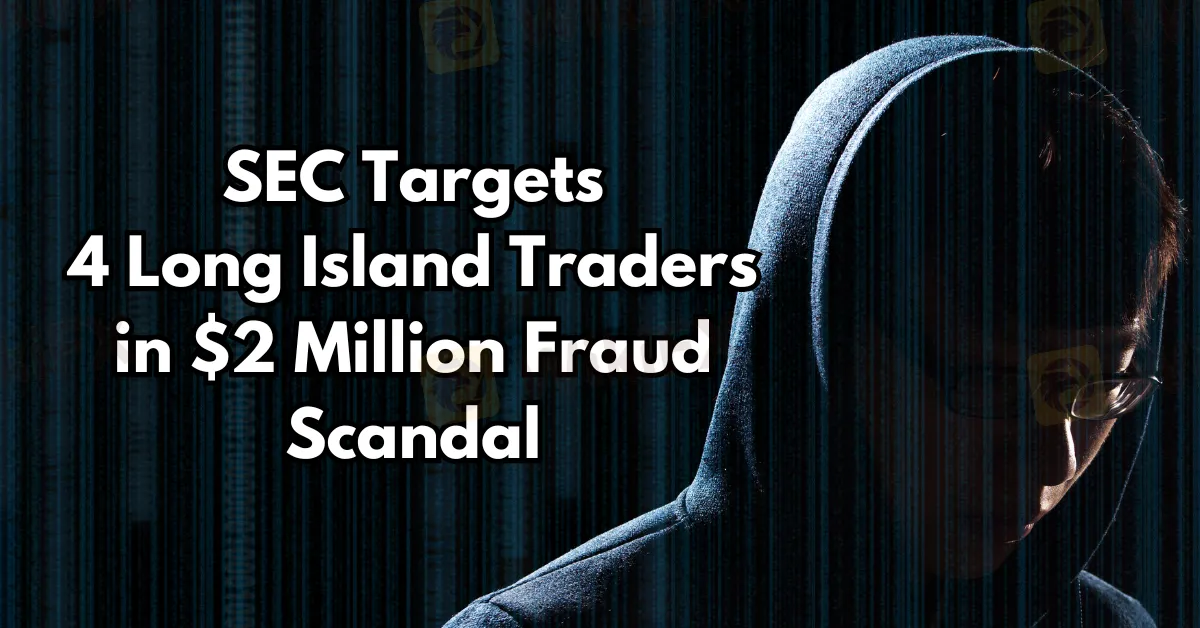简体中文
繁體中文
English
Pусский
日本語
ภาษาไทย
Tiếng Việt
Bahasa Indonesia
Español
हिन्दी
Filippiiniläinen
Français
Deutsch
Português
Türkçe
한국어
العربية
SEC Targets 4 Long Island Traders in $2 Million Fraud Scandal
Abstract:The Securities and Exchange Commission sets its sights on a group of Long Island traders, accusing them of orchestrating a multi-million-dollar fraud scheme, unravelling a web of deception in the world of securities trading.

In a recent development, the Securities and Exchange Commission (SEC) has levied allegations against Eduardo Hernandez, Christopher Flagg, Daquan Lloyd, and Corey Ortiz, individuals associated with Long Island, New York, accusing them of orchestrating a lucrative “free-riding” scheme over several years, amassing illicit gains surpassing $2 million.
The SEC contends that spanning approximately November 2018 to January 2022, the accused parties were engaged in what's known as a free-riding scheme. This dubious practice involves trading securities without possessing adequate funds to cover the transactions, a clear breach of regulatory standards.
According to the SEC's complaint, the defendants established unfunded brokerage accounts, often dubbed “loser accounts,” as part of their alleged scheme. These accounts served as vehicles for generating trading profits through matched trading with winner brokerage accounts under their purview.
Moreover, the complaint alleges that the defendants maintained these loser accounts at a brokerage firm offering instant deposit credit. Exploiting this credit, they purportedly financed trades within loser accounts through manipulated prices with winner accounts, often using thinly-traded options to execute their manoeuvres.

The crux of the alleged wrongdoing lies in the defendants' purported transfer of credit provided by the broker from loser accounts to winner accounts. This manoeuvre, as claimed, enabled them to accumulate guaranteed profits at the brokerage's expense. It's estimated that over the relevant period, the defendants utilized at least 600 brokerage accounts to repeatedly execute their purportedly fraudulent scheme.
In response to these allegations, the SEC has taken legal action. The complaint, filed in the U.S. District Court for the Eastern District of New York, brings charges against Hernandez and Flagg for violating antifraud provisions under Section 10(b) of the Securities Exchange Act of 1934 and Rules 10b-5(a) and (c) thereunder. Additionally, they are accused of further violations by allegedly acting through or with the assistance of another individual, a contravention of Exchange Act Section 20(b). Ortiz and Lloyd are implicated for aiding and abetting Hernandez's and Flagg's purported violations.
The SEC's legal pursuit aims to secure various forms of relief, including permanent injunctive relief, conduct-based injunctions, disgorgement coupled with prejudgment interest, and imposition of civil penalties.
This unfolding narrative underscores the intricate interplay between regulatory oversight and financial malfeasance, shedding light on the challenges posed by illicit schemes in the realm of securities trading. As legal proceedings unfold, the ramifications of these allegations will undoubtedly reverberate across the financial landscape.

Disclaimer:
The views in this article only represent the author's personal views, and do not constitute investment advice on this platform. This platform does not guarantee the accuracy, completeness and timeliness of the information in the article, and will not be liable for any loss caused by the use of or reliance on the information in the article.
Read more

Doo Financial Expands Regulatory Reach with Offshore Licenses in BVI and Cayman Islands
According to the report, Doo Group, a prominent Singapore-based online brokerage firm, has strengthened its global presence by securing new offshore licenses for its brokerage brand, Doo Financial. The company recently announced that entities under the Doo Financial umbrella have been granted licenses by two key offshore regulatory bodies: the British Virgin Islands Financial Services Commission (BVI FSC) and the Cayman Islands Monetary Authority (CIMA).

Why is there so much exposure against PrimeX Capital?
In recent months, PrimeX Capital, a Forex and CFD broker established in 2022, has become a subject of concern in the trading community. However, despite these enticing features, the broker's reputation has been severely tarnished by multiple complaints and a troubling lack of regulatory oversight.

The Hidden Checklist: Five Unconventional Steps to Vet Your Broker
Forex broker scams continue to evolve, employing new tactics to appear credible and mislead unsuspecting traders. Identifying these fraudulent schemes requires vigilance and strategies beyond the usual advice. Here are five effective methods to help traders assess the legitimacy of a forex broker and avoid potential pitfalls.

Doo Financial Obtains Licenses in BVI and Cayman Islands
Doo Financial, a subsidiary of Singapore-based Doo Group, has expanded its regulatory footprint by securing new offshore licenses from the British Virgin Islands Financial Services Commission (BVI FSC) and the Cayman Islands Monetary Authority (CIMA).
WikiFX Broker
Latest News
ASIC Sues Binance Australia Derivatives for Misclassifying Retail Clients
AIMS Broker Review
The Hidden Checklist: Five Unconventional Steps to Vet Your Broker
WikiFX Review: Is FxPro Reliable?
Malaysian-Thai Fraud Syndicate Dismantled, Millions in Losses Reported
Trading frauds topped the list of scams in India- Report Reveals
YAMARKETS' Jingle Bells Christmas Offer!
Doo Financial Expands Regulatory Reach with Offshore Licenses in BVI and Cayman Islands
Why is there so much exposure against PrimeX Capital?
Russia to Fully Ban Crypto Mining in 10 Regions Starting January 1, 2025
Currency Calculator


